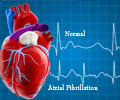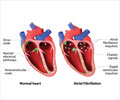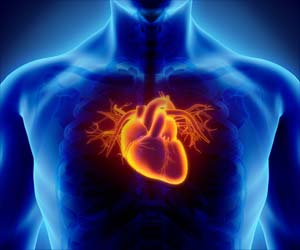A new mouse model of atrial fibrillation (AFib) named “HOMER” was used to test if and how macrophages can cause AFib.

Recruited macrophages elicit atrial fibrillation
Go to source). For the work, //senior author Matthias Nahrendorf, MD, PhD, an investigator in MGH’s Center for Systems Biology and the Richard Moerschner Endowed MGH Research Institute Chair in Men's Health, and colleagues analyzed single cells from atrial heart tissue collected from patients with and without AFib.
‘Macrophages, a type of immune cell, exhibit the highest level of dynamism within the atria during atrial fibrillation. #irregularheartrhythm #heartdisease #heartdisorder ’





“We found that recruited macrophages support inflammation and fibrosis, or scarring, of the atria, which hinder electrical conduction between heart cells and lead to AFib. Inhibiting macrophage recruitment reduced AFib,” says Nahrendorf.
Gene Expression Analysis Uncovers SPP1 as a Key Player: Implications for AFib and Tissue Scarring
Gene expression analyses revealed that in human and mouse hearts, the SPP1 gene is highly overexpressed in macrophages during AFib. This gene produces the SPP1 protein (also called osteopontin) that promotes tissue scarring and is elevated in the blood of patients with AFib. HOMER mice lacking this protein had reduced numbers of atrial macrophages.Future therapeutic strategies for AFib could therefore target macrophages or macrophage-derived signals such as SPP1 that contribute to inflammation and fibrosis. “We think that this research lays the groundwork for immunomodulatory therapy of AFib, and we are currently working on several strategies to make this happen,” says Nahrendorf.
It will also be important to study how these strategies might complement current care. “By mapping cardiac and immune cells involved in atrial fibrillation, this research advances next steps toward studying how macrophage-targeted therapies may support existing treatment,” says Michelle Olive, PhD, the deputy chief of the Atherothrombosis and Coronary Artery Disease Branch within the Division of Cardiovascular Sciences at the National Heart, Lung, and Blood Institute.
Reference:
- Recruited macrophages elicit atrial fibrillation - (https://www.science.org/doi/10.1126/science.abq3061)












